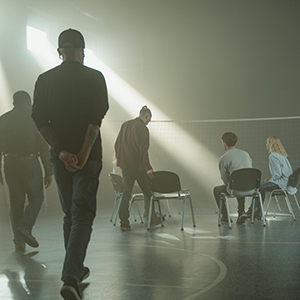Attachment insecurity predicts outcomes in an ACT-CBT group therapy for adults in a physical rehabilitation centre

Accepted: August 23, 2022
Appendix: 130
HTML: 34
All claims expressed in this article are solely those of the authors and do not necessarily represent those of their affiliated organizations, or those of the publisher, the editors and the reviewers. Any product that may be evaluated in this article or claim that may be made by its manufacturer is not guaranteed or endorsed by the publisher.
Authors
Adapting to chronic illness or disability is accompanied by acute and ongoing illness stressors. Psychological factors such as emotional distress and low self-efficacy are common experiences in chronic illness and disability and interfere with adaptation and psychosocial outcomes such as health-related quality of life. Transdiagnostic group psychotherapy may provide a parsimonious approach to psychological treatment in rehabilitation care by targeting shared illness stressors across mixed chronic illnesses and disabilities, and shared processes that maintain psychological symptoms. Attachment theory may explain individual differences in outcomes and help identify individuals at risk of poor health-related quality of life trajectories. Adults (N=109) participated in an 8-week process-based ACT-CBT psychotherapy group at a tertiary care physical rehabilitation centre between 2016 and 2020. Participants completed measures of emotional distress, self-efficacy, health-related quality of life, and attachment at pre- and post-treatment. Multilevel analyses indicated that patients improved on most outcomes at post-treatment. Attachment anxiety at pre-treatment was associated with more positive outcomes. Reliable change indices suggest clinically meaningful change for the majority of participants, but most were not recovered. Results provide proof-of-concept for the transdiagnostic group intervention and suggest that a longer course of treatment may be clinically indicated. Results warrant replication with larger and more diverse samples, and more robust designs.
How to Cite

This work is licensed under a Creative Commons Attribution-NonCommercial 4.0 International License.
PAGEPress has chosen to apply the Creative Commons Attribution NonCommercial 4.0 International License (CC BY-NC 4.0) to all manuscripts to be published.
Similar Articles
- Racheli Miller, Mark J. Hilsenroth, Paul L. Hewitt, Perfectionism and therapeutic alliance: a review of the clinical research , Research in Psychotherapy: Psychopathology, Process and Outcome: Vol. 20 No. 1 (2017)
- Franco Del Corno, Further reflections about the document: Psychotherapy for Anxiety and Depression: benefits and costs , Research in Psychotherapy: Psychopathology, Process and Outcome: Vol. 20 No. 2 (2017)
- Marco Solmi, Mara Campeol, Federica Gentili, Angela Favaro, Carla Cremonese, Clinical presentation and need for treatment of a cohort of subjects accessing to a mental illness prevention service , Research in Psychotherapy: Psychopathology, Process and Outcome: Vol. 23 No. 1 (2020)
- Chiara Manfredi, Gabriele Caselli, Federica Pescini, Martina Rossi, Daniela Rebecchi, Giovanni Maria Ruggiero, Sandra Sassaroli, Parental criticism, self-criticism and their relation to depressive mood: an exploratory study among a non-clinical population , Research in Psychotherapy: Psychopathology, Process and Outcome: Vol. 19 No. 1 (2016): Special issue on Qualitative and Quantitative Research in Child and Adolescent Psychotherapy: part 2
- Peter Muntigl, Naomi Knight, Adam O. Horvath, Ashley Watkins, Client Attitudinal Stance and Therapist-Client Affiliation: A View from Grammar and Social Interaction , Research in Psychotherapy: Psychopathology, Process and Outcome: Vol. 15 No. 2 (2012)
- Emanuela Brusadelli, Christian Schubert, Silvia Salcuni, Facing the coronavirus pandemic era , Research in Psychotherapy: Psychopathology, Process and Outcome: Vol. 23 No. 3 (2020)
- Ana Catarina Nunes da Silva, António Branco Vasco, Jeanne C. Watson, Alexithymia and therapeutic alliance: a multiple case study comparing good and poor outcome cases , Research in Psychotherapy: Psychopathology, Process and Outcome: Vol. 21 No. 2 (2018)
- Olga Fernández González, J. Carola Pérez, Mariane Krause, The relation between the therapeutic alliance and communicative intentions in therapeutic interaction during the initial phase of adolescent therapy , Research in Psychotherapy: Psychopathology, Process and Outcome: Vol. 22 No. 2 (2019)
- Corinne Talbot, Rose Ostiguy-Pion, Esther Painchaud, Claudelle Lafrance, Jean Descôteaux, Detecting alliance ruptures: the effects of the therapist’s experience, attachment, empathy and countertransference management skills , Research in Psychotherapy: Psychopathology, Process and Outcome: Vol. 22 No. 1 (2019)
- Marta Vigorelli, Gruppo di ricerca coordinato da Marta Vigorelli , Research in Psychotherapy: Psychopathology, Process and Outcome: Vol. 13 No. 2 (2010)
<< < 15 16 17 18 19 20 21 22 23 24 > >>
You may also start an advanced similarity search for this article.

 https://doi.org/10.4081/ripppo.2022.634
https://doi.org/10.4081/ripppo.2022.634




